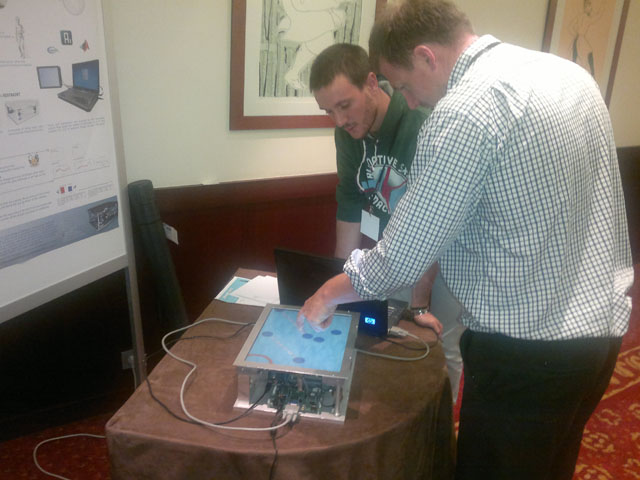From the 26th till the 28th Mario and Michele have been at the pHealth 2012, the 9th International Conference on Wearable Micro and Nano Technologies for personalized Health where we presented the paper “Force and touch make video games ‘serious’ for dexterity rehabilitation” with a corresponding demo.
 |
 |
| The train from Lisboa to Porto | The demo session of our Force Panel |
The abstract of our paper cites “Computerized interfaces are able to represent 3D immersive simulations. Most of them make use of joystick, mouse, gloves or grasp pressure transducers. Those have the drawback of ‘filtering’ the user interaction and/or de-locate the touch with respect to the visual stimulus. To overcome this we developed dexterity rehabilitation games on a novel touch interface that measures also force. The system allows dexterity training through ‘direct’ manipulation of virtual objects in 3D. Two dimensions via the touch screen, the third by the force channel. Tactile feedback is provided with a vibration device mounted on the screen back.”
 |
 |
 |
| Michele talk | Demonstration in action | Demonstration parade |
pHealth is a very well organized congress with a well ‘balanced’ number of attendees, not too much to make the event too ‘noisy’ and dispersive, nor too restricted.
We had the opportunity to share different opinions about serious games and their applications for rehabilitation and to understand the current research trends. Our instrument, the Force Panel, we realized is in line with the concurring technological and clinical trends.
Serious games for health include psychological therapy, cognitive training, physical rehabilitation, as well as exergaming – games used as a form of exercise. Serious games can be embedded into custom VR environment or use off the shelf computerized systems. The benefits of using VR technology for rehabilitation have been the subject of many studies. Several outcomes demonstrate that people with disabilities are capable of motor learning within virtual environments and movements learned in VR transfer to real world equivalent motor tasks, and can even generalize to other untrained tasks. There is evidence that proprioceptive and exteroceptive feedback, associated with the execution of skilled tasks, induces brain changes at cellular and synaptic level. In a virtual environment feedback about performance can be augmented with respect to the real world case.
On this track we developed a custom instrument, the Force Panel, in the framework of the VERITAS FP7 project with the aim to quantify the dexterity of different categories of impaired peoples. VERITAS employes those data to simulate the use of different products in the design phase in order to assess its accessibility even before prototyping. The same instrument we realized could also be used for serious games for health. It is also important to note that the system makes use of technologies partly already available, although actually measuring pressure instead of force and with screen sizes generally limited due to the main focus on phone applications, but that will
be certainly widespread in the near future both on computers and mobile phones.
The 28th of june we obviously attended the soccer game italy vs germany.
 |
 |
| Porto before the match | A maxi screen in a place of Porto, in front of the
famous river |
To finish, it is compulsory to report the beauty of the place, especially night time.
 |
 |
 |
 |

